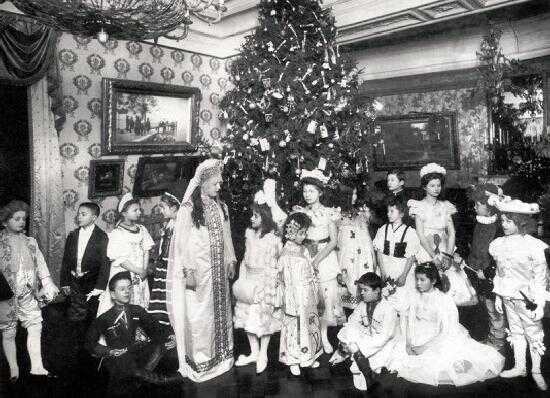
Figure 1.--Here we see wealthy Russian children celebrating Christmas (January 1914). Notice that the children are in costume. World War I that would end the Tsarist Empire would break out in the summer. |


|
Christmas is a religious holiday. The celebration of Christmas, however, were of course strongly affected by the political regime under which Russia was goverened. Russian Orthodox Christians during the Tsaeist era celebrated Christmas on January 7. Celebrations and fortune telling lasted for 12 days throught to Epiphany. This is the manifestation of Christ to the Gentiles, represented by the Magi. The Western view of Russian Christmas is strongly influenced by Peter Ilyich Tchikowsky's famed "The Nutcracker". Virtually every American child, especially the girls, has seen "The Nutcracker" ballet. This is, however, rather misleading. The Soviets of course discouraged the celebration of religious holidays such as Christmas. Christmas in fact was abolished. Many Christmas traditions were eventually transferred to New Years. Although the annual celebration of the Revolution for a toimebecame the holiday that children got their gifts. Many religious traditions were suppressed during the Communist era. Before the Revolution, even without Christmas, Russian children had Father Frost. Although Soviet officials first question the revolutionary credentials of Grandfather Frost, they eventually embraced him whole heartedly. We are not sure how Christmas traditions are faring in post-Soviet Russia. One journalist reports that she saw many features of Christmas in Moscow during 2002 such as twinling lights, Christmas songs, toy soldiers, and Christmas tree ornaments in markets. She notes, howeber, that Moscow authorities have mandated that ship keepers should have Christmas lights. Moscow's mayor Yuri Luzhkov has mandated this. Many in the provinces still observe the Orthodox Christmas. This is not yet the general pattern in cities like Moscow. Russians despite the encouragement to celebrate Christmas seem to prefer New Years.
Russian Orthodox Christians during the Tsaeist era celebrated Christmas on January 7. Celebrations and fortune telling lasted for 12 days throught to Epiphany. This is the manifestation of Christ to the Gentiles, represented by the Magi. The Western view of Russian Christmas is strongly influenced by Peter Ilyich Tchikowsky's famed "The Nutcracker". Virtually every American child, especially the girls, has seen "The Nutcracker" ballet. This is, however, rather misleading. The Christmast pictured actually looks more German than Russian. It is about a rich little girl in a very westernized urban, family. This is not the Christmas that most Russian children at the tome experienced. And the whole idea of gift giving and Christmas trees is not the Christmas primoted by the very conservative Russian Orthodox Church.
The Soviets of course discouraged the celebration of religious holidays such as Christmas. Christmas in fact was abolished. Many Christmas traditions were eventually transferred to New Years. Although the annual celebration of the Revolution for a toimebecame the holiday that children got their gifts. Many religious traditions were suppressed during the Communist era. Before the Revolution, even without Christmas, Russian children had Father Frost. Although Soviet officials first question the revolutionary credentials of Grandfather Frost, they eventually embraced him whole heartedly.
A Russian reader writes, "New year or Christmas wasn't celebrated officially at all until second half of Stalin's rule (1943 -). Instead of that, the day when all children got gifts was November 7 - the Bolshevik Revolution holiday." I think this means that the modern Russian News Years celebration which is now a major holiday owes the traditions like Father Frost to the modern era during and after World war II. Soviet citizens brought and decorated New Years trees, gave New Years gifts, sent New Years cards, and splurged with food and of course New Years drink. [Applebaum. p.29.]
We are not sure how Christmas traditions are faring in post-Soviet Russia. One journalist reports that she saw many features of Christmas in Moscow during 2002 such as twinling lights, Christmas songs, toy soldiers, and Christmas tree ornaments in markets. She notes, howeber, that Moscow authorities have mandated that ship keepers should have Christmas lights. Moscow's mayor Yuri Luzhkov has mandated this. Many in the provinces still observe the Orthodox Christmas. This is not yet the general pattern in cities like Moscow. Russians despite the encouragement to celebrate Christmas seem to prefer New Years. Some oe simply used to New Years. Others are not attracted by religion. Some Russiand have begun to celebrate Christmas, but it is still a work day in Russia. Russian who elebrate Christmas on December 25 tend to live in cities, be affluent, and relatively young. A number are Roman Catholics. Many are those Russians who identify the country's future with the West. [Applebaum. p.29.]
That as far ascwe can tell is a definite minoriy. A reader in 2008 reports, "The Christmas or Winter holiday preparations start in November. The secular aspects of the holiday are most prominant. There were Santa/Granfather Frost images everywhere. The GUS Department Store had a lovely display. Everywhere were Christmas/New Year trees. The authorities mandate fir tree displays and it was so. All the displays gibe a lovely holiday feeling and here are a lot of activities leading up to New Years and Christmas. The best seem reserved for the January 1 New Year celebrations. There are not a lot of religious images outside of the churches. Tghe only hint of Cht=ristmas in the decorations is sometimes we see St. Nicholas rather than Grandfather Frost. While he is clearly dressed as a bishop, he is never depicted in a religious setting, but more like Santa Claus."
Applebaum, Anne. "Santa's Russia" Washington Post (December 25, 2002), p. 29.
Navigate the Boys' Historical Clothing Web holiday pages:
[Return to the Main Russian Christmas page]
[New Years]
[Valetines]
[St. Patrick's Day]
[Easter]
[Fourth of July]
[Haloween]
[Thanksgiving]
[Christmas]
Navigate the Boys' Historical Clothing Web Site:
[About Us]
[Introduction]
[Activities]
[Biographies]
[Chronology]
[Cloth and textiles]
[Garments]
[Countries]
[Topics]
[Bibliographies]
[Contributions]
[FAQs]
[Glossaries]
[Images]
[Links]
[Registration]
[Search]
[Tools]
[Boys' Clothing Home]
